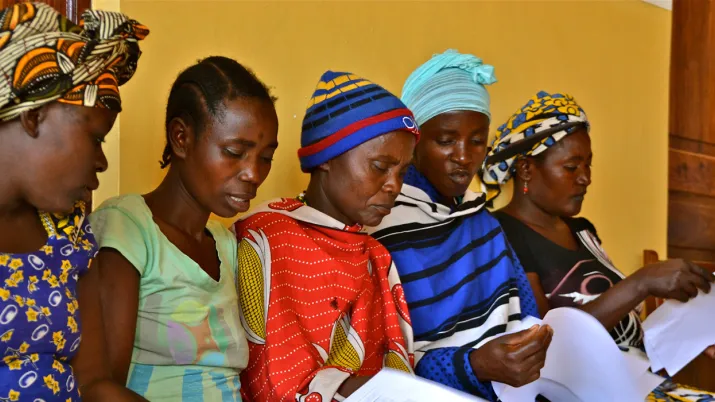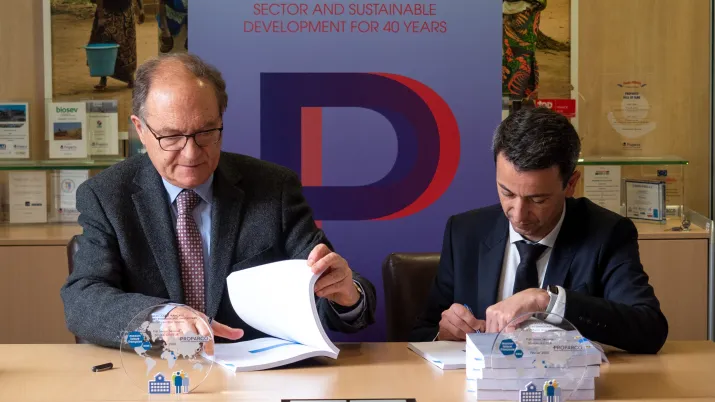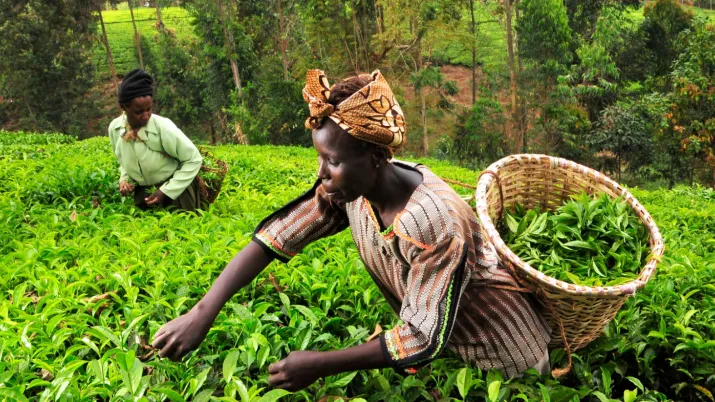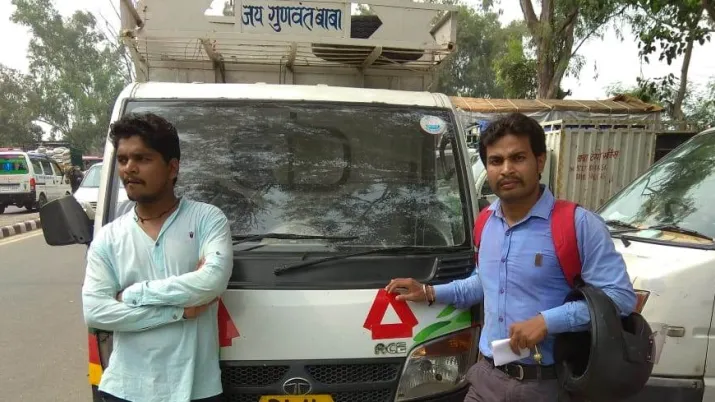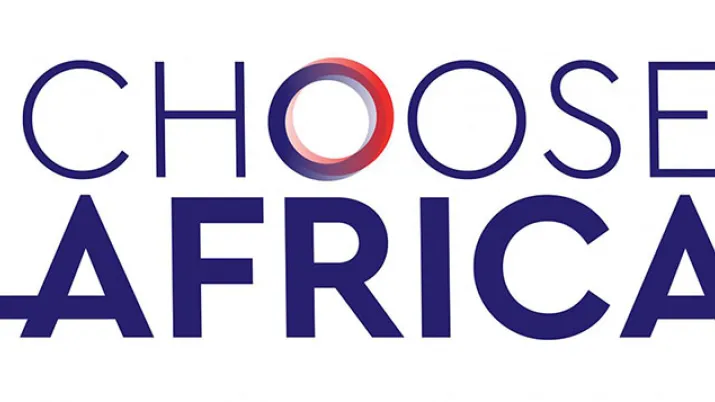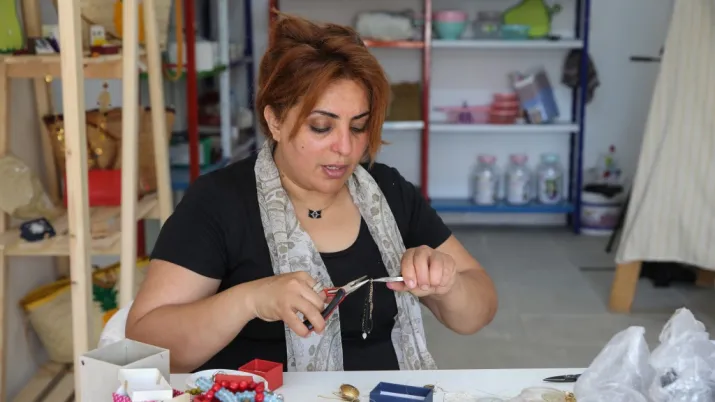News
Coronavirus: The AFD Group is Mobilized
In the face of the coronavirus pandemic, AFD Group is adapting its operational and human resource systems. The group is working on a response aimed at limiting any health-related or economic damage in...
Published on
Proparco and First City Monument Bank work together to support MSMEs in Nigeria
Proparco and First City Monument Bank (FCMB) signed a NGN 2 billion risk-sharing facility agreement, which will cover up to NGN 4 billion worth of loans granted by FCMB to Nigerian micro, small and me...
Published on
In the DRC, PROPARCO is supporting Advans, a financial institution for micro-entrepreneurs
Despite its exceptional mining resources, DRC is a Low-Income Country. The Congolese private sector is nevertheless resistant and continues to invest, with private companies playing a major role in th...
Published on
Does entrepreneurship really empower women?
Concerns about gender inequalities and, more generally, women’s empowerment around the world are today central development issues. Empowerment is also increasingly seen through the prism of women’s en...
Published on
Proparco supports the development of the Mission laïque française
By granting 65 million euros to the Mission laïque française, historic operator of French education abroad, for projects in Morocco, Côte d'Ivoire, Lebanon, Egypt and Ethiopia, Proparco supports the d...
Published on
Harnessing the private sector to reduce gender inequality
The new issue of the magazine Private sector and Development focuses on the role of the private sector in reducing gender inequalities in developing countries. Despite increased awareness since the ad...
Published on
Are digital technologies set to revolutionise SME financing in Africa?
According to Aiaze Mitha, an entrepreneur and Fintech expert, the many digital innovations that are emerging and already exist could transform each stage of the financing value chain, opening a new er...
Published on
Proparco signs a new partnership agreement with Bank of Palestine to support the Palestinian SMEs
Proparco and the Bank of Palestine strengthen their strategic partnership through signing a USD 5 million risk-sharing facility agreement which will cover up to USD 10 million worth of loans granted b...
Published on
Mentoring and support: A key element in the sustainability of SMEs.
While there is a need for more research in the area of entrepreneur mentoring in Africa, the existing research shows a return on mentoring investment (ROMI) in the form of economic growth through reve...
Published on
Proparco supports Faten, Palestine’s leading microfinance institution
Microfinance institutions play an essential role in supporting entrepreneurs and companies in creating jobs and increasing access to essentials goods and services. Through a 8 million loan granted to...
Published on
Cameroon: 90% of the labor force trapped in the informal sector
The informal sector occupies a disproportionate position in Cameroon. While it ensures the survival of many workers, it prevents the country’s development by maintaining low incomes and reducing its t...
Published on
Proparco supports the Indian microfinance institution Annapurna with a credit line of USD 15 million
On the occasion of the 2020 edition of AFIForum, which takes place on January 22 and 23 in Bangkok, Proparco signed an agreement with the Indian microfinance institution (MFI) Annapurna, for a USD 15...
Published on
A new generation of women in Ghana in Ghana with Legacy Girls College
Located in Akuse, in the Eastern Region of Ghana, Legacy Girls’ College provides quality and affordable education to 400 girl students. From 2015, the school is looking to form a new generation of Gha...
Published on
Proparco invests in RENSOURCE, its first transaction in partnership with the EU in the offgrid energy sector
With the support of the European Union (EU), PROPARCO invests USD 3 million equity in RENSOURCE (Holdings), a key player in the renewable energy sector in Nigeria. This is the first investment made by...
Published on
Proparco participates in Metier’s new investment fund dedicated to sustainable infrastructure in Africa
Through a USD 10 million commitment to Metier Sustainable Capital International Fund II, Proparco will continue its support of renewable energy, resource efficiency and energy efficiency projects in A...
Published on
SME Finance as seen by regulators : Focus on Sub-Saharan Africa
Access to finance for African SMEs is a key challenge. Through this article, the Alliance for Financial Inclusion (AFI) aims to share the experiences and practices of member countries that have implem...
Published on
Proparco signs its first credit line to a transport finance company in South Asia, Shriram Transport Finance C...
By granting USD 70 million to Shriram Transport Finance Company (STFC) for the financing of Compressed Natural Gas (CNG) light commercial vehicles, Proparco seeks to contribute to the mitigation of pa...
Published on
Digitisation in Africa: Channelling Funding to SMEs
Could innovation emerge from near destruction? Would the digitisation that led to the global financial crisis preclude SMEs from obtaining the finance they needed to continue playing the crucial role...
Published on
Financing and supporting SMEs, the example of Vatel Madagascar
This article was published in Jeune Afrique in December 2019.
Published on
In Tunisia, Enda is boosting women’s entrepreneurship
The pioneer of microfinance in Tunisia, Enda has been demonstrating for almost 30 years that microcredit is a powerful driver for poverty reduction and economic development. Boosting women’s entrepren...




